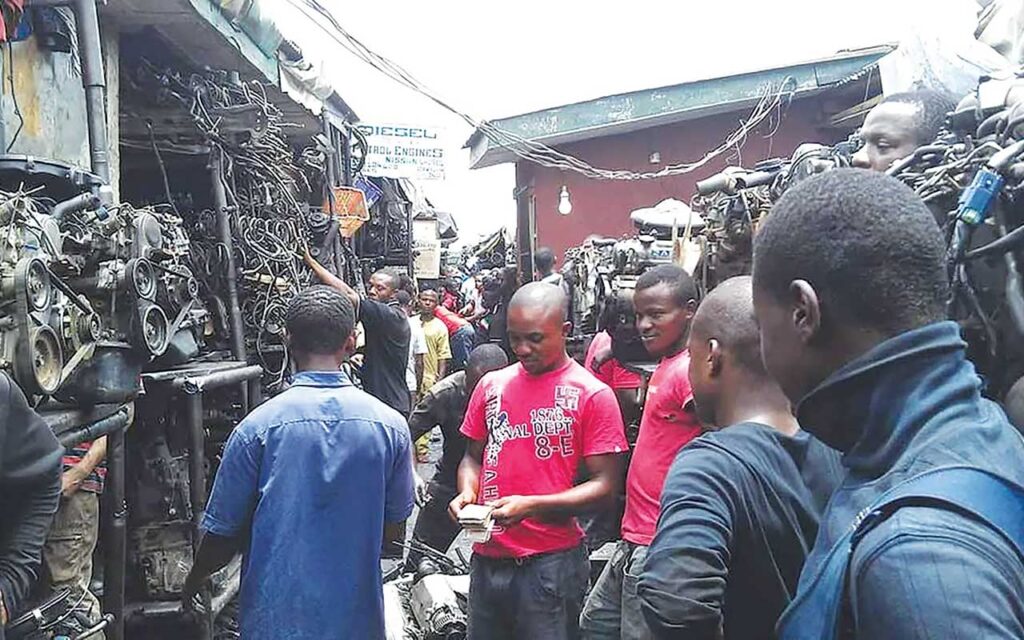
• NCS Is Confusing Stakeholders – Clearing Agents
Barely one year after the Federal Government endorsed a concession agreement to reposition the operations of the Nigeria Customs Service (NCS), there are worries that the $3.1 billion e-Customs projects might have hit the brick wall with the delay in the formal signing of the agreement by parties involved.
The Federal Executive Council (FEC), presided over by President Muhammadu Buhari, on September 2, 2020, ratified the NCS modernisation scheme estimated to cost about $3.1b.
The e-Customs project had earlier generated controversy among stakeholders in the industry who were of the belief that the existing Customs automation platforms could be upgraded to fit the purpose, rather than wasting a whopping $3.1b on a new project, which will start from scratch.
Since the ratification of the project by the FEC, there has not been any meaningful development about its commencement date, or acquisition of necessary facilities that would aid operations.
National Public Relations Officer of Customs, Joseph Attah, however, denied that the project is stalled. He told The Guardian that: “The process is ongoing, and installation of scanners will begin as soon as possible.”
Meanwhile, facilitators of the project said it would improve Customs’ clearance efficiency in facilitating trade, stimulating end-user satisfaction, and fostering mutually beneficial relationships between consumers and the Customs.
Although the stakeholders who spoke with The Guardian on the matter supported the need for a complete overhaul of Customs operations, while its officers should be trained in modern technology, they averred that the project, wrapped under the “Customs Modernisation Project,” whose mandate includes, establishing a digital/paperless Customs administration, is an initiative of the Federal Government that is aimed at concessioning the revenue-collection function of the service to a consortium of private firms.
The Minister of Finance, Budget and National Planning, Zainab Ahmed, while appraising the project had said that it has the potential to yield up to $176 billion in revenue for the country.
She said the main objective of the project was to completely automate every aspect of Customs business and institutionalise the use of smart and emerging technologies to enhance the statutory function of the organisation in the area of revenue generation.
She revealed that the project would be financed through Public-Private Partnership (PPP), for a concessionary period of 20 years.
“So, Council has ratified Mr. President’s approval for the PPP concession for a 20-year period to Messers e-Customs HC Project Limited, as a concessionaire for the delivery of Customs modernisation project.
“This is a project that will not have an immediate cost to the government, the investors are providing all of the financings and this revenue will be deployed in three phases, and they will look over the investment in the concessionary period of 20 years.
“The key point is that it is not costing the Federal Government anything, the $3.1 billion being proposed will be sourced by the sponsors and the partners,” she said.
She further said that the project would enable the complete automation of the NCS processes and procedures using the application and information technology in all aspects.
According to her, the PPP group approved for the project is led by Messers Y Technologies with four other members.
“The Bionica Technologies West Africa Limited, Bargain Securities and Supplies Nigeria Limited are lead sponsor and co-sponsor. We also have The Africa Finance Corporation (AFC) as the lead financier, and Huawei Technology as a technical service provider,” she said.
Although the minister said that the Customs currently has some of its functions and duties automated, she said: “This is end-to-end automation of all of Nigeria’s Customs Service processes and it’s going to bring huge value to the country.
“So, this investment of $3.1 billion is broken down into capital investment of $1.2 billion, which will be done in three phases over 36 months by these investors, and $1.1 billion is our projection of the operational cost over the 20-year period of the implementation of this project.
“This project has the potential to yield up to $176 billion of revenue and the consortia that are providing this investment are going to be paid overtime according to the schedule that is negotiated for their investments including their profits and cost.
“So, this is the best possible way for Nigeria to roll out important capital projects using funds from the private sector, and providing service for the use of the Nigerian people and the government,” she said.
When implemented, the e-Customs project would encompass, among other things, the deployment of e-Customs Production Applications, including e-Clearance, e-Port System, Risk Control Centre (RCC), Logistics Management System (LMS), Electric Cargo Tracking System (ECTS), Intelligent Gate (i -Gate) and Mobile Enforcement (ME).
However, stakeholders in the industry are worried that the automation drive, as laudable as it sounds, is a smart way of concessioning the Customs, through private business interests.
The President, National Association of Government Approved Freight Forwarders (NAGAFF), Increase Uche, in a chat with The Guardian said, the introduction of e-Customs is a duplication of electronic technologies that have been promoted by the same Customs over the years.
“We don’t understand what Customs is doing. They are just deceiving the importing public. They already have the National Integrated Customs Information System – NICIS II. They started with ASYCUDA 2.7, which means Automated System for Customs Data. We had not completed that process before they took us to ASYCUDA 3.0. From there, to ASYCUDA World. Now, we have NICIS 1, and later NICIS 2. We don’t even know where one starts, and where it ends. That has been the problem. They are just confusing the stakeholders.
“They should just stop these ideas; they are just confusing the importing public. This is a mere strategy to embezzle the government’s money. Let them come out and tell us what value the e-Customs will add to our operations. What we know is that the entire logistic chain is facing a lot of problems, and until we deploy technology to the fullest in the entire cargo clearance process and documentation, we may not get it right in this country,” he said.
The President, National Council of Managing Directors of Nigerian Licenced Customs Agents (NCMDLCA), Lucky Amiwero, also bemoaned the introduction of a new digital system, at the expense of existing ones, which equally cost the nation millions of naira.
He said: “This is just a clear waste of resources because we have an existing e-platform (which means electronically supplied information). That is what they (Customs) are using at the moment, and they can upgrade it if it is not up to date. If the license is giving problems, they can review the whole thing and make it to suit their expectations.
“By the provision of the agreement between Webb Fontain, and the Federal Government represented by the Ministry of Finance, they are supposed to have transferred the platform back to Customs because it is a Customs property. What they are using now is e-platform and they can upgrade it as they deem fit,” he said.
A finance expert partnering with the Bionica-led consortium, Chief Ben Okoye, said with the new project, the government would be able to free up resources, which could be channeled to other areas, activities and projects.
“This will in turn support and build the local economy of the host communities, through direct or indirect participation of small and medium-sized companies by affording them the opportunity to serve as service providers. It will also improve the quality of service delivery of the NCS as a result of the effective infrastructure that is in place, and restore consumer confidence in NCS officials and processes.”













